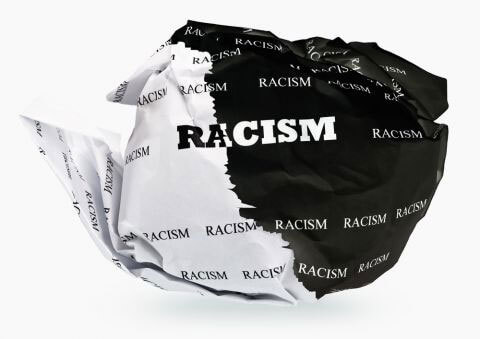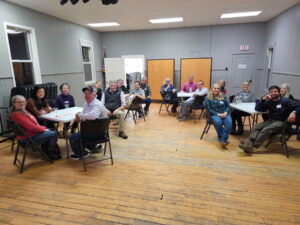Braver Angels Magazine
Growing up in the United States of America—a nation defined in many minds by its fraught racial history—and observing public life at a time when racial sensitivities are constantly prodded and enflamed, it is easy to think that there is no greater sin in the world than racism. To be racist, or even to ever have been racist, is seen by many to define a person’s character. So it is a shocking, though I believe necessary, thing to say, that there are nonetheless things worse than racism. To confront racism properly and effectively, we must be aware of what some of those things are—and resist the temptation to embody those things when fighting for the cause of antiracism.
I’m reminded of this reality as I watch the public reaction to actor Liam Neeson’s two interviews in which he discussed a painful period of his past, in which brutal personal tragedy plunged him into a racist mania. As Neeson explains, nearly 40 years ago a female friend of his was raped by a black man. In what sounds like a delirium of vengeful fantasy, Neeson describes himself as “going up and down areas with a cosh [a bludgeon] …hoping some black bastard would come out of a pub and have a go at me about something, ya’ know? So that I could—kill him.” He did this, he says, for over a week following the incident, until better sense took hold of him again.
It is a bitter story to listen to. Though it’s a 40-year-old anecdote, one can imagine how different things might have been had some black man stumbled drunkenly out of a pub and said the wrong words to Neeson, or had even simply bumped into him in a dark alley where no one was around to see. Liam Neeson could have been a murderer, motivated by what at that point had become racial hatred, however short-lived it was. Mr. Neeson’s psychological response to a horrendous personal tragedy put him in a mentality where he was prepared to commit a truly monstrous act of evil upon an innocent person of a particular racial background. There are few things worse than that.
But that is not what happened. Time gave Neeson’s anger the chance to subside. In his telling, he spoke to a priest and to friends, and engaged in the vigorous physical activity of powerwalking, until he had overcome the irrational hatred that filled his mind.
40 years later—a few weeks ago, now—he recounted the story with shame and honesty on camera, while explaining how he taps into feelings of vengeance to inform his role in an upcoming film. The clip, of course, immediately went viral, with commentators, public figures, and activists around the world immediately condemning Neeson for the lynch-mob-like, though unconsummated, passions and motivations and actions of his past which he has now confessed to. There are many who do not seem inclined to forgive him any time soon.
I can remember another story, 15 years ago and in my own life. I was sitting with a group of my fellow black teenagers in a high school math class. One of them—let’s call him Travell—was talking about another class, in which he and his friends had been shown some episodes of the African-American historical drama “Roots.”
“Watchin’ that shit make you wanna kill white people, man!” he explained, to my rapt attention. “I was pumped comin’ outta class man, just lookin to catch some white boy slippin’. Then when we got off the bus we saw a group Mexicans walkin’ to the bus stop.” Punching his fist into his palm he exclaimed, “Shit homie, close enough!”
Travell told us about how they molly-wopped (beat up) this group of Mexicans. I don’t know how serious it was. But it happened. Travell’s reaction, after exposure to the historic wrongs of racial abuse dramatized in Roots, was every bit as irrational as Neeson’s reaction to his friend’s rape. But on another level, it is also every bit as understandable.
Travell hadn’t experienced a personal tragedy, and he wasn’t intent on killing anyone, either. But like Neeson, he’d grown up in the midst of tribal violence. In the interview, Liam Neeson describes having been raised in Northern Ireland in the 1960’s during “The Troubles,” a period of terrorism and intense guerilla warfare between Protestants and Catholics in that contested territory. Travell grew up in South Central Los Angeles in the 1990s, and was acculturated early on to gunshots, fistfights, police intimidation and the informal governance of the Bloods and the Crips. Justice, for these young men separated by time, race, and distance, had the taste of tribal retribution. Even more fundamentally, violence against alien others was a means of coping with anger and indignation. It was the way in which the world around them coped with its problems.
This gets closer to the truth about where racism falls on the hierarchy of man’s sins and vices. Racism is a complex, multi-definitional phenomenon, and in its worst and darkest form, it commits its practitioners to the most detestable and evil acts recountable in the human experience- the African slave trade and the institution of slavery in the United States, anti-Semitic pogroms and ethnic cleansing eventually leading to the Holocaust, racial terrorism best exemplified by the Ku Klux Klan, and any number of horrific genocides committed against various ethnic groups in world history. Then, a step beneath this, there is racism of institutions and hierarchies that oppresses minorities without destroying them, legally suppressing rights and privileges that should be available to all in a decent society.
Then there is the racism (perhaps better thought of as social prejudice) that causes individuals to demean others on account of race or ethnicity, to feel uncomfortable around others because of this; or simply to prefer to keep to one’s own, and to define ‘one’s own’ in an ethnically exclusive manner. In today’s mainstream American culture, this latter form of racism earns social condemnation as just as fixed and unredeemable as the racism of actual violence or material discrimination in their racism. Moreover, it is made unredeemable, even if it lies deep in the past and has been repented for.
The racism that Liam Neeson might have been guilty of, were his fate less sparing, would have fallen in the first, personal, violent category. But fate turned out differently, and his racism remained an intense but temporary personal prejudice. Furthermore, there is no evidence to suggest that Neeson’s fleeting racism was spawned by any prior conviction that blacks were less than human—only a rage in the moment that convinced him that they were his tribal enemy. This would not have softened the tragedy of the murder of an innocent man.
But Neeson has long since repented of his racial malice, has repented for what he would have done, but did not do. The Nonviolent philosophy of Martin Luther King, Jr., to which I subscribe, teaches that this repentance and softening of heart is precisely what those of us who wish to see a world of true racial harmony seek and practice. What more can one ask for? In offering his story of his own mistakes with contrition, Neeson is being condemned for something that ought to have earned him some measure of praise.
Racism stands as a titanic evil in our historic past and present world mostly because of the actions and effects that have followed from it. Racism can justify every other type of evil- systematic oppression, senseless violence, and more. Therefore, racism is a clear and present danger to humanity—one that must be dealt with in ways appropriate to its depth and manifestation. But if it goes too far, antiracism can justify evils as well. Its nobler premise and aims do not exempt it from excesses with which we must be concerned—its acolytes are just as human as their racist opponents are.
One does not have to draw historical parallels between the violence of John Brown (whose anti-slavery zeal is hard not to admire today) to the violence of modern Antifa protestors to get to this point. The point applies to conversation as well. The antiracist and politically-correct activism of our modern moment, as it applies to our mainstream cultural conversation, has the effect of foreclosing forgiveness and redemption, not just for true crimes rooted in prejudicial hatred, but also for mere social trespasses.
It may be the case that Virginia Governor Ralph Northam has compromised his ability to continue in office by misrepresenting events after a college picture of him in blackface surfaced. But it would seem that if he has served his state well as Governor, and has shown no trace of racial prejudice since his college days, he could be forgiven. Similarly, after talk-show host Megyn Kelly questioned the relative badness of blackface out of an (admittedly astonishing) ignorance of its history, she was released from her position at a major news network, despite having apologized quickly and profusely for her mistake.
Celebrities and powerful political figures are not the only victims of this social ostracizing, and they can usually handle it better than the more typical victims- untold numbers of mothers and fathers, brothers and sisters, friends, employees, neighbors, and colleagues whose relationships have been ruined, and whose reputations have been maligned, because it was revealed to their circles that they once held attitudes that modern sensibilities find offensive. Even the act of forgiving people who have repented of their past racism is met with social punishment (as actor Terry Crews, who suggested that Neeson should be forgiven, has sadly learned.) It is legitimate to find prejudice offensive. But if society does not reward those who repent and seek forgiveness for their prior perspectives, what incentive is there for those seized with racist attitudes to abandon them?
Racism is truly wicked when it is accompanied by murder, exploitation and persecution, because murder, exploitation and persecution are themselves evils in the human experience. They damage people’s lives in irreparable and enduring ways. One can be non-racist—or even antiracist (as we all should be)—and still be guilty of evils like these. But one can also be racially prejudiced and not be guilty of evils like murder and persecution. Unto themselves, these and other lesser vices of human nature, including dishonesty, selfishness, cruelty and the tendency to be unforgiving, are all worse, in my judgment, than simple racism unaccompanied by these other sins.
There is indeed an inherent tragedy in racism, however—one that makes it wrong even in its mildest form. Racism, at a very minimum, implies an inability to forge a social connection with a fellow human-being, simply because of a certain ethnic category. It implies a lack of openness to the love and friendship to be discovered with people who do not look like you or share your particular cultural experience. It implies that one is cut off from any notion of human inclusivity, of humanity as a larger family.
This milder, and probably much more common, form of racism or social prejudice also stands as a barrier to the maximal evolution of human moral culture. The Beloved Community, of which Dr. King spoke, is not merely one where violence is absent, but one where love is present and pervading. The way to achieve such a community is to allow people the greatest leeway to repent of their prejudices and to grow into more charitable human beings. To restrict our capacity for forgiveness and redemption is not to counter the force of racism in our society, but perversely and unintentionally, to enable it. It is an evil worse than racism.





8 thoughts on “There Are Evils Worse Than Racism”
Well said, John. Being willing to forgive people is _so_ important! In the words of a great prophet of a couple of millenia back, “Let him [or her] who is without sin cast the first stone.”
Thank you John for the insightful article. Kudos for the courage.
Looking forward to read more from you.
Great argument for forgiveness. But more than that, a window into the intolerance of intolerance.
I am a Blue (to the left of Bernie Sanders!) and I agree with you. I have been inviting progressives to look at this blind spot of ours for 50 years. You have allies on the left.
This was a great read. I recently participated in a discussion on the book White Fragility in Omaha, NE. One of the points I tried to articulate (from the perspective of a white person) is that we (white people) have to advance our communication skills so that we can effectively call out instances of racism without putting the person we’re calling out on the defensive so much that the conversation doesn’t go anywhere. Calling someone a “racist” has become such an intractable, irredeemable character flaw that too often it shuts the conversation down before it starts. And that’s why I LOVED this question Wood poses in this article: “If society does not reward those who repent and seek forgiveness for their prior perspectives, what incentive is there for those seized with racist attitudes to abandon them?” White people have to start doing our part in fighting racism, but as a society we also have to create space for forgiveness and redemption if there is any hope for progress.
Thank you, John, for a great article. I appreciated the comments, as well. I was saddened by the vilification of Neeson because I believe he was, in his own somewhat awkward way, trying to say, “I was wrong. I have changed.” As human beings, this is central to our enlightenment, to listen to rational arguments and have the intellect and strength of character to change our minds, and sometimes admit we were wrong. It seemed to me Neeson was attempting to share his mistake so others might reconsider their own racist attitudes. Of course, it was also an attempt to absolve himself, but that doesn’t negate his sincerity.
I googled “Is racism worse than actual slavery?” and your insightful article came up. Thank you for the courage to be the voice of both sides of this racial debate! I will look into your cause and consider financial support.
I think that any abuse is wrong but when I think of the range of abuse that children at school have been subjected to I cannot understand why this subject has not been addressed. Where most adults can , up to a point, walk away from it , children are known to have been horribly verbally and physically abused both at school and on social media when they eventually go home. There is something dreadfully wrong when children feel there is no way out of this and ultimately commit suicide. This has happened frequently in the U.K. Teachers , police and also parents seem unable to stop this horrendous abuse of children but we all know if has to stop and the only way it can is if the problem is given a much higher profile by the police , politicians and the public!